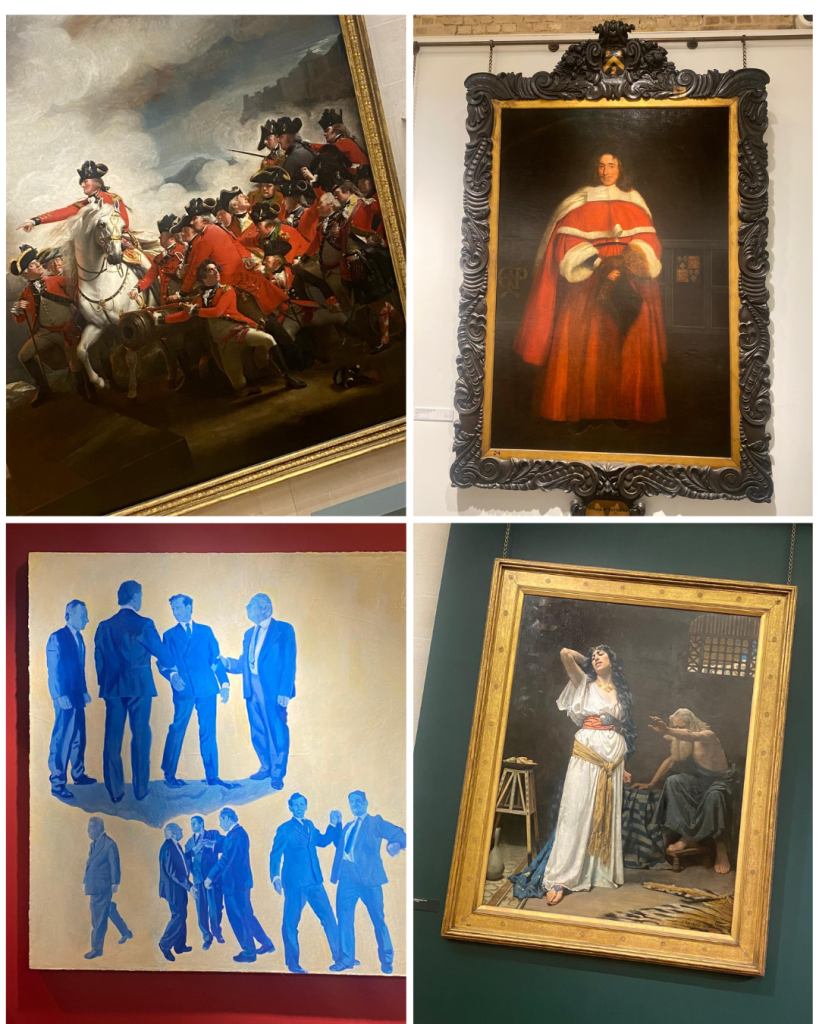The Guildhall left me spellbound
I recently had the pleasure of being introduced to a new friend—someone with an air of mystery, a knack for adventure, and a deep appreciation for places that brim with history. One day, this friend invited me to join them on a quiet stroll to a place that was, to me, both unfamiliar and intriguing: the Guildhall building.
From the moment we entered, I could feel the weight of the place, its walls adorned with art and stories that stretched back across time. It was grand yet intimate, like walking into a secret society where each portrait held more than a moment captured in paint. My gaze wandered over faces that seemed to know more than they let on—men of wealth, power, and prestige. Some looked noble, others stern, but as I lingered longer, a mischievous thread seemed to tie them all together.
I’ve always been captivated by art, the way it reflects and distorts the world, pulling you into its depths. And here, the paintings drew me in like a lover whispering secrets. These men—figures who clearly had their hands in shaping history—were immortalised with a kind of seriousness that demanded respect. Yet, the longer I stared, the more I saw something else. There was an energy, a quiet rebellion in their eyes, a shared glance that said, *“We’ve gotten away with something.”*
It was impossible not to smile. The more I studied them, the more I could imagine the conversations they’d had, the deals struck behind closed doors, and the schemes concocted over fine cigars and aged spirits. They looked like men who had *done things* significant things, but also men who had revealed in the thrill of bending rules, of pushing boundaries, and of savouring the power they held, not just in their hands but in their minds.
There’s something seductive in that kind of power. Not the overt, showy type, but the kind that whispers through history, lingering in the air long after the men themselves have gone. It’s the allure of being part of something larger, something unseen, that tugs at your imagination.

I couldn’t help but be drawn to them, these phantom-like figures who seemed to wink at me from their ornate frames. They looked like they had enjoyed the art of the game—playing it with grace, with intellect, and with just a touch of mischief. I could almost feel them calling out, daring me to imagine the world they inhabited, to see the layers of intrigue that lay beneath their carefully painted exteriors.
Perhaps that’s the magic of history—the way it invites us to read between the lines, to interpret what’s not said, what’s not seen. The Guildhall, with its elegance and its history, was more than just a building that day. It became a living, breathing tapestry of stories, of silent conspiracies, of whispered promises exchanged in shadowed corners.
As I stood there, with my new friend beside me, I realised that the allure wasn’t just in the paintings themselves, but in what they represented—a glimpse into the complex dance of power, privilege, and playfulness. A reminder that even the most revered figures of history, behind their polished façades, were still human. And like all of us, they had their secrets, their desires, and their moments of mischief.
The Guildhall left me spellbound, not just by its art but by the sense that history is never quite as straightforward as it seems. It’s filled with hidden layers, just waiting for someone to step closer, to look a little longer, to be seduced by the stories that have been left untold.
And now, whenever I think back on that day, I can’t help but smile. There’s something incredibly enticing about the idea that even those who came before us, with all their grandeur and authority, were just as complex, as curious, and as mischievous as we are today.
